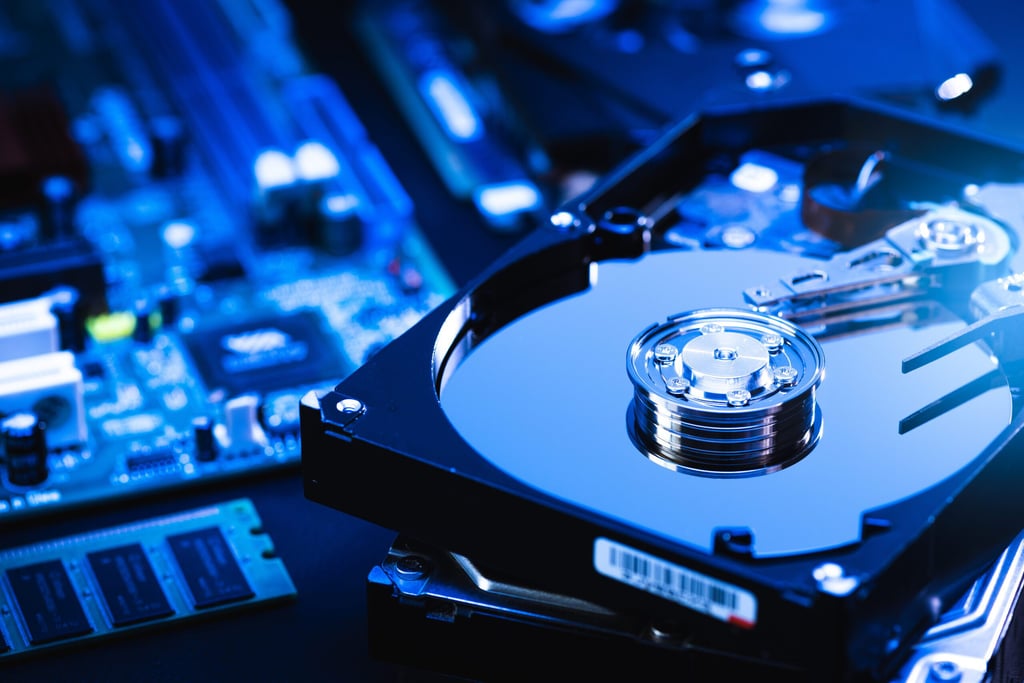
The abstract image of inside of hard disk drive on the technician's desk and a computer motherboard as a component. the concept of data, hardware, and information technology.
The most significant difference between traditional mechanical hard disk drives (HDDs) and flash memory is speed. Flash memory is much faster because it uses a solid-state memory chip with no moving parts. Hard drives use disk platters with a magnetic coating that takes a magnetic imprint of the data saved onto the platters—as the disk […]

The most significant difference between traditional mechanical hard disk drives (HDDs) and flash memory is speed. Flash memory is much faster because it uses a solid-state memory chip with no moving parts. Hard drives use disk platters with a magnetic coating that takes a magnetic imprint of the data saved onto the platters—as the disk platter spins, a read-and-write head either retrieves data from the spinning platter or writes data to the platter.
But is faster always better, and are there still use cases for which HDDs are more well-suited than flash? We compared flash and HDDs to see if the faster new technology can completely replace the older one, or if both still earn their keep. At a high level we found that flash is best for working with high-resolution images produced by applications similar to computer-aided design, geographic information systems, or video editing software, while HDDs are best for meeting mass storage requirements when data must be stored for several years and does not need to be accessed very often. This article compares the two in more detail.
| Description | Flash Memory (SSDs) | Hard drives |
| Hard drive type | Semiconductor storage device | Electromechanical storage device |
| How data is saved | Magnetic disk platter | Nonvolatile semiconductor chips |
| Cost of 2.5 inch 1TB capacity | At least $80 | Between $40 and $60 |
| Power expenditure | Requires less power than HDDs | Consumes more power |
| Speed | Faster (200 to 550MB/s) | Slower (80 to 160 MB/s) |
| Lifespan | Five years or longer | 3 to 5 years |
| Durability | No moving parts and can withstand being dropped | Moving parts are damageable if dropped |
Learn more: Flash Storage vs. SSD: What’s the Difference
In most cases, flash solid state drives are better performers with increased durability and reliability, but not everyone needs those benefits.
Learn more: What is Flash? NAND vs. NOR
Business professionals and content creators need the faster responsiveness and the durability of solid state drives and should avoid HDDs.
While their cost has come down, solid state drives using flash remain more expensive than HDDs. Data centers or server arrays using multiple drives to backup and archive data that won’t be accessed frequently might still opt for the affordability of HDDs, as might businesses looking to outfit computers for a number of employees that have minimal processing demands—those using only productivity software, for example. But on nearly every performance metric, flash-based solid state drives outperform traditional mechanical hard disk drives.
Read next: Is the Hard Disk Drive Obsolete?

Don Hall is a contributing writer to Enterprise Storage Forum, where he covers data storage technology, storage hardware and software, and data networking. He worked for more than two decades as an IT Supervisor for the federal government and as IT Operations Supervisor for an IT Military Command managing programmers, cybersecurity staff, and infrastructure and networking personnel. Previously he worked as an application programmer. Don earned a B.S. in Business Information Systems from San Diego State University and has certificates in Technical Communication and web development with an emphasis in Java/Open Source. He has also had an active CompTIA Security + (ce) since 2011, and a Network +(ce) since 2015.

Enterprise Storage Forum offers practical information on data storage and protection from several different perspectives: hardware, software, on-premises services and cloud services. It also includes storage security and deep looks into various storage technologies, including object storage and modern parallel file systems. ESF is an ideal website for enterprise storage admins, CTOs and storage architects to reference in order to stay informed about the latest products, services and trends in the storage industry.
Property of TechnologyAdvice. © 2025 TechnologyAdvice. All Rights Reserved
Advertiser Disclosure: Some of the products that appear on this site are from companies from which TechnologyAdvice receives compensation. This compensation may impact how and where products appear on this site including, for example, the order in which they appear. TechnologyAdvice does not include all companies or all types of products available in the marketplace.